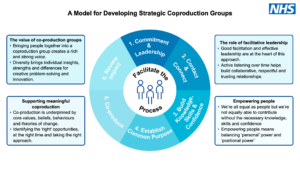Strategic co-production
An approach to strategic co-production
What is strategic co-production?
The term ‘strategic co-production’ is used to describe the role of peer leaders in co-producing policy, strategy, guidance, good practice and quality improvement at a ‘strategic’ or ‘high-level’.
What is a peer leader?
A peer leader is a person with lived experience who is committed to working collaboratively with the health and care system to provide leadership and empowerment for strategic co-production, peer support and self-management education.
The purpose of strategic co-production
The purpose of strategic co-production is to raise the voice of people with relevant lived experience of a long-term health condition or disability to shape and influence strategic decisions.
The Lived Experience Team at NHS England has developed an approach that pays attention to how good decisions are made, the impact of power and how change happens.
This approach to strategic co-production emphasises the importance of bringing people with lived experience into co-production groups and supports the development of people’s knowledge, skills and confidence. It does not mean that people can only do co-production as part of a co-production group, but that co-production groups have a key role to play.
The voice of a strategic co-production group has a power and richness that comes from combining and debating different views and ideas over time. It can help reach a consensus about the best strategy, policy or course of action for a whole population. Then, when individuals are invited to steering group meetings to help develop a particular policy, for example, they can draw on this broader, shared understanding as well as their own lived experience.
Facilitative leadership
We know that good strategic co-production does not just happen. It requires good facilitation and strong leadership. The term ‘facilitative leadership’ reflects the dual role of ‘facilitator’ and ‘leader’.
Facilitation is the ‘process of making something possible or easier’. When it comes to strategic co-production with peer leaders, a facilitator plans, guides and manages strategic co-production sessions. They do it by ensuring that peer leaders are able to fully participate, and their contributions are meaningful.
Good facilitation also requires effective leadership. A facilitative leader will:
- look ahead and identify opportunities for peer leaders to become active
- facilitate conversations and discussions skilfully so everyone feels listened to and understood
- take a leadership role that provides direction for peer leaders
- have a clear vision and strategy for peer leadership and be aware of the direction of travel for national, regional and local health and care policy.
A model for developing a strategic co-production group
The role of peer leaders and facilitative leadership is central to this model for developing a strategic co-production group. It emphasises the value of co-production groups and the important role of facilitative leadership in enabling meaningful co-production.
The model also recognises the importance of empowering people, so they have knowledge, skills, and confidence to work equally with health and care professionals.
There are six phases in this model:
- Getting commitment and leadership from key stakeholders, for example, senior leaders in an organisation or people in authority.
- Contacting and connecting with people with relevant lived experience.
- Developing people’s knowledge, skills and confidence via the Peer Leadership Development Programme
- Developing a common purpose for the group so everyone is on the ‘same page’ with shared aims and objectives
- Actively engaging in strategic coproduction
- Reviewing the impact of strategic coproduction to demonstrate the difference it has made.
Resources
Working in partnership with people and communities: statutory guidance: This guidance is for integrated care boards, NHS trusts, foundation trusts and NHS England. It supports effectively partnership working with people and communities to improve services and meet the public involvement legal duties.
Contact us
If you would like more information about this approach, please e-mail england.pldp@nhs.net

